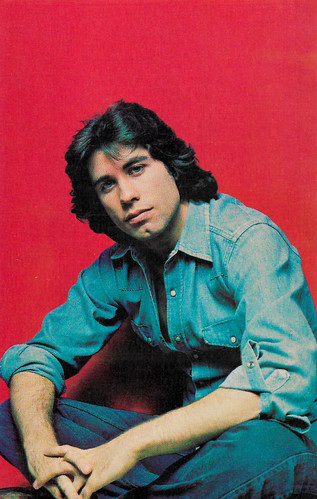
American postcard by Coral-Lee, Rancho Cordova, CA, no. CL/Personality #12. Photo: Douglas Kirkland / Contact, 1977.

German promotion card by Polydor, no. 118. John Travolta in Grease (Randal Kleiser, 1978).
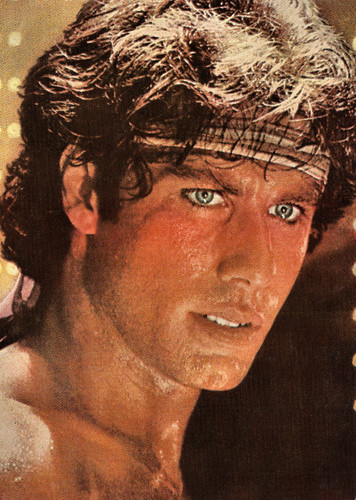
Romanian postcard by Casa Filmului Acin, no. C.P.C.S. 33 150. John Travolta in Staying Alive (Sylvester Stallone, 1983).

British postcard, no. C077. John Travolta in Pulp Fiction (Quentin Tarantino, 1994). The Hitman: "You play with matches, you get burned."

Vintage autograph photo. John Travolta in Broken Arrow (John Woo, 1996).
A latter-day Rebel Without a Cause in the New York City disco nightlife
The youngest of six children, John Travolta was born in 1954 in Englewood, New Jersey, an inner-ring suburb of New York City in Bergen County, New Jersey. His father, Salvatore "Sam" Travolta was a semiprofessional American football player turned tire salesman and partner in a tire company. His mother, Helen Travolta (née Helen Cecilia Burke) was an actress and singer who had appeared in The Sunshine Sisters, a radio vocal group, and acted and directed before becoming a high school drama and English teacher. His siblings Joey, Ellen, Ann, Margaret, and Sam Travolta were all inspired by their mother's love of theatre and drama and became actors.
He was raised Roman Catholic but converted to Scientology in 1975. Travolta attended Dwight Morrow High School. By the age of 12, Travolta himself had already joined an area actors' group and soon began appearing in local musicals and dinner-theater performances. He started acting appearing in a local production of 'Who'll Save the Plowboy?'. At 16 he landed his first professional job in a summer stock production of the musical 'Bye Bye Birdie'.
In 1971, he dropped out of school at age 17 and moved across the Hudson River to New York City. He made his off-Broadway debut in 1972 in 'Rain' and then landed a small role in the touring company of the hit musical 'Grease'. Then followed on Broadway 'Over Here!', starring The Andrews Sisters, in which he sang the Sherman Brothers' song 'Dream Drummin''.
He then moved to Los Angeles to try Hollywood. Travolta's first screen role in California was as a fall victim in the television series Emergency!, in September 1972, but his first significant film role was as Billy Nolan, a bully who was goaded into playing a prank on Sissy Spacek's character in the horror film Carrie (Brian De Palma, 1976), the first film adaptation of a Stephen King novel.
Around the same time, he landed the role as Vinnie Barbarino in the ABC TV sitcom Welcome Back, Kotter (1975–1979), in which his sister, Ellen, also occasionally appeared as Arnold Horshack's mother. He shot to overnight superstardom, and his face instantly adorned T-shirts and lunch boxes. Travolta had a hit single titled 'Let Her In', peaking at number 10 on the Billboard Hot 100 chart in July 1976. That year, he starred in the TV movie The Boy in the Plastic Bubble (Randal Kleiser, 1976).
Then followed the first of his two most noted screen roles: Tony Manero in Saturday Night Fever (John Badham, 1977). Jason Ankeny at AllMovie: "A latter-day Rebel Without a Cause set against the backdrop of the New York City disco nightlife, it positioned Travolta as the most talked-about young star in Hollywood. In addition to earning his first Academy Award nomination for Best Actor, he also became an icon of the era, his white-suited visage and cocky, rhythmic strut enduring as defining images of late-'70s American culture."
He followed it up with the part of Danny Zuko in the film adaptation of Grease (Randal Kleiser, 1978) with Olivia Newton-John. Its box-office success was even greater than Saturday Night Fever's. Both films were among the most commercially successful pictures of the decade and catapulted Travolta to international stardom. Saturday Night Fever earned him an Academy Award nomination for Best Actor, making him, at age 24, one of the youngest performers ever nominated for the Best Actor Oscar. Travolta performed several of the songs on the Grease soundtrack album.
After the laughable May-December romance Moment by Moment (Jane Wagner, 1978) in which he starred with Lily Tomlin, Travolta, in 1980, inspired a nationwide country music craze that followed on the heels of his hit film Urban Cowboy (James Bridges, 1980), in which he starred with Debra Winger. Another success was the thriller Blow Out (Brian De Palma, 1981) with Nancy Allen.

Dutch postcard, no. AX 7380.

Dutch postcard, no. AX 7377. John Travolta and Olivia Newton-John in Grease (Randal Kleiser, 1978).

Dutch postcard, no. AX 7381. John Travolta in Grease (Randal Kleiser, 1978).

Dutch postcard, no. AX 7377. John Travolta and Olivia Newton-John in Grease (Randal Kleiser, 1978).

Dutch postcard, no. AX 7376.
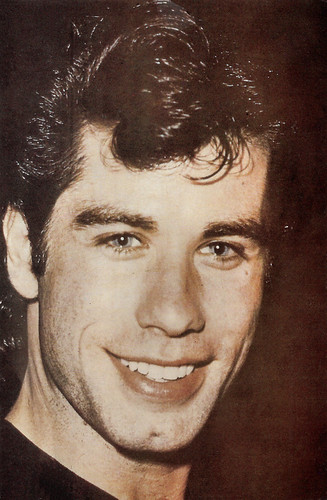
Dutch postcard, no. AG 1015. John Travolta in Grease (Randal Kleiser, 1978).
Travolta reportedly waived his salary to play the role
During the 1980s, John Travolta starred in a series of commercial and critical failures that sidelined his acting career. These included Two of a Kind (John Herzfeld, 1983), a romantic comedy reuniting him with Olivia Newton-John, and Perfect (James Bridges, 1985), co-starring Jamie Lee Curtis.
He also starred in Staying Alive (Sylvester Stallone, 1983), the sequel to Saturday Night Fever, for which he trained rigorously and lost 20 pounds. The film was a financial success, grossing over $65 million, though it, too, was scorned by critics.
During that time, Travolta was offered, but declined, lead roles in what would become box-office hits, including American Gigolo (Paul Schrader, 1980) and An Officer and a Gentleman (Taylor Hackford, 1982), both of which went to Richard Gere, as well as Splash (Ton Howard, 1984), which went to Tom Hanks.
In 1989, Travolta starred with Kirstie Alley in Look Who's Talking (Amy Heckerling, 1989), which grossed $297 million, making it his most successful film since Grease. He subsequently starred in Look Who's Talking Too (Amy Heckerling, 1990) and Look Who's Talking Now (Tom Ropelewski, 1993).
But it was not until he played Vincent Vega in Quentin Tarantino's hit Pulp Fiction (1994), with Samuel L. Jackson and Uma Thurman, for which he received an Academy Award nomination, that his career was revived. Quentin Tarantino, a longtime Travolta fan, wrote the role of Vincent Vega specifically with the actor in mind. Jason Ankeny at AllMovie: "Travolta reportedly waived his salary to play the role. A critical as well as commercial smash, Pulp Fiction introduced Travolta to a new generation of moviegoers, and suddenly he was again a major star who could command a massive salary, with a second Academy Award nomination to prove it."
Travolta was inundated with offers. He followed Pulp Fiction with the Elmore Leonard adaptation Get Shorty (Barry Sonnenfeld, 1995). His turn as Mafioso-turned-movie producer Chili Palmer is acclaimed by many critics as his finest performance to date. The film was another major hit. Then followed roles in White Man's Burden (Desmond Nakano, 1995), Broken Arrow (John Woo, 1996), and Face/Off (John Woo, 1997) with Nicolas Cage. He also played a charismatic, Bill Clinton-like U.S. President in Primary Colors (Mike Nichols, 1998) opposite Emma Thompson. The political satire was critically acclaimed but earned only $52 million from a $65 million budget.

Dutch postcard. John Travolta and Olivia Newton-John in Grease (Randal Kleiser, 1978).

French postcard in the Collection John Travolta by Star, Paris. John Travolta in Grease (Randal Kleiser, 1978). Sent by mail in 1986.

French postcard in the Collection John Travolta by Star, Paris. Caption: John Travolta, 1978. Sent by mail in 1985.

Spanish collectors card in the Cine Exitoso series by Ediciones Este, Barcelona, no. 230. Debra Winger and John Travolta in Urban Cowboy (James Bridges, 1980).
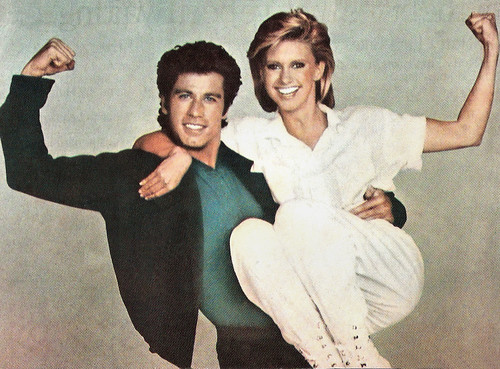
Romanian postcard by Casa Filmului Acin, no. 53190. John Travolta and Olivia Newton-John in Two of a Kind (John Herzfeld, 1983).
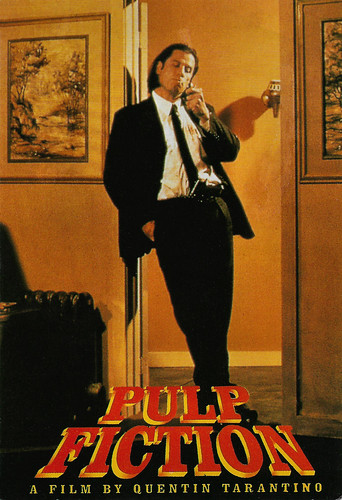
French postcard, no. C 583. John Travolta in Pulp Fiction (Quentin Tarantino, 1994).
A leader of a group of aliens that enslaves humanity
In 2000, John Travolta starred in and co-produced the science fiction film Battlefield Earth (Roger Christian, 2000), based on the novel of the same name by L. Ron Hubbard, in which he played the villainous leading role as a leader of a group of aliens that enslaves humanity on a bleak future Earth. The film had been a dream project for Travolta since the book's release in 1982 when Hubbard had written to him to try to help make a film adaptation. The film received almost universally negative reviews and did very poorly at the box office. Travolta's performance in Battlefield Earth also earned him two Razzie Awards.
Throughout the 2000s, Travolta remained busy as an actor, starring in many films, including Swordfish (Dominic Sena, 2001) with Hugh Jackman and Halle Berry, the crime-comedy Be Cool (F. Gary Gray, 2005) in which he again played ultra cool Chili Palmer, and the biker road comedy Wild Hogs (Walt Becker, 2007) starring Tim Allen.
In 2007, Travolta played Edna Turnblad in the remake of Hairspray (Adam Shankman, 2008), his first musical since Grease. In the Disney computer-animated film Bolt (Chris Williams, Byron Howard, 2008), Travolta voiced the title character. The next year, he appeared in the re-make of The Taking of Pelham 123 (Tony Scott, 2009) opposite Denzel Washington and in Old Dogs (Walt Decker, 2009) with Robin Williams.
Since 2010, Travolta has starred mostly in action films and thrillers. In 2016, he returned to television in the first season of the anthology series American Crime Story, titled The People v. O. J. Simpson, in which he played lawyer Robert Shapiro.
Travolta was in a relationship with actress Diana Hyland, 18 years his senior, whom he met while filming The Boy in the Plastic Bubble (1976). They remained together until Hyland's death from breast cancer in 1977. Travolta also had an on-again/off-again relationship with actress Marilu Henner, which ended permanently in 1985. He married actress Kelly Preston in 1991, and they bought a house in Islesboro, Maine. They had three children: Jett (1992–2009), Ella Bleu (2000), and Benjamin (2010).
In 2009, Jett died at age 16 while on a Christmas vacation in the Bahamas. A Bahamian death certificate was issued, attributing the cause of death to a seizure. Jett, who had a history of seizures, reportedly suffered from Kawasaki disease since the age of two. In 2020, Travolta's wife, Kelly Preston, died at the age of 57, two years after she had been diagnosed with breast cancer. Travolta has been a practitioner of Scientology since 1975. Following the death of his wife Kelly Preston in July 2020, Travolta hinted on his Instagram account that he would be putting his career on hold, stating "I will be taking some time to be there for my children who have lost their mother, so forgive me in advance if you don’t hear from us for a while."

Belgian postcard by Multichoice Kaleidoscope. Photo: Isopress / Outline (Bernstein).

British postcard, no. MM 389. Photo: John Travolta in Pulp Fiction (Quentin Tarantino, 1994).

British postcard by Memory Card, no. 78. Samuel Jackson, John Travolta, Bruce Willis, and Uma Thurman in Pulp Fiction (Quentin Tarantino, 1994). Caption: lobby card.

Vintage postcard, no. 2102. John Travolta and Uma Thurman in Pulp Fiction (Quentin Tarantino, 1994). Caption: John n Uma at table.

British postcard by Pyramid Posters, Leicester, no. PC9577. Photo: Miramax Film Corp. John Travolta and Samuel Jackson in Pulp Fiction (Quentin Tarantino, 1994). Caption: Guns B&W.

Vintage autograph card.
Sources: Jason Ankeny (AllMovie), Wikipedia and IMDb.
No comments:
Post a Comment